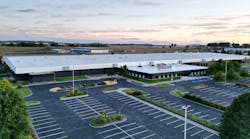GE Aerospace and Clemson University has received funding from the U.S. Air Force Research Laboratory (AFRL) to continue to develop next-generation materials that can withstand intense temperatures while flying at high speed.
Tony Mathis, president and chief executive of GE Edison Works, made the announcement alongside officials from Clemson University.
The Air Force Research Laboratory has authorized $10 million in Congressional-appropriated funding to date for the research.
A consortium, including GE Aerospace, Clemson University, and Missouri University of Science and Technology, is working to develop ceramic-matrix composite materials that would be lighter and better able to withstand extreme temperatures than metal alloys in use, yet still strong enough to maneuver during high-speed flight.
"Today's announcement represents a major milestone in the development of next-generation materials that will push the boundaries of what is possible in flight," Mathis said. "The research we are conducting will grow the U.S. innovation ecosystem, particularly in the area of advanced materials."
In addition to the security benefits, the new materials are expected to improve engine efficiency, reduce environmental impact, enhance structural safety of the fuselage, and revolutionize the time required to travel by air from one location to another. The materials could have both military and commercial applications, researchers said.
Clemson University President Dr. James P. Clements said the research builds on the University's established leadership in advanced materials research.
"We are proud to support GE on this exciting project with the U.S. Air Force Research Laboratory," Clements said. "This collaboration will drive innovation in advanced materials and help maintain U.S. competitiveness necessary for the workforce of the future."
The research is supported by U.S. Senator Lindsey Graham (R-S.C.) and U.S. Representative James E. Clyburn (D-S.C.).
Senator Graham said that investment in research and development is key to maintaining the nation’s competitive edge. “I appreciate Air Force Research Lab and the consortium collaborating on this important project,” Graham said. “Clemson’s continued prioritization of advanced materials research ensures that our state and nation stay at the forefront of technological capabilities in ceramic-matrix composites.”
Congressman Clyburn said the research will provide new opportunities for students to work on the cutting edge of advanced materials. “The investments we make today in education and workforce development are critical to building a prosperous future for South Carolina,” he said. “Our universities, including Clemson, are key to this effort and to meeting the critical research needs for a strong national defense while also preparing our workforce for the opportunities of the 21st century.”
